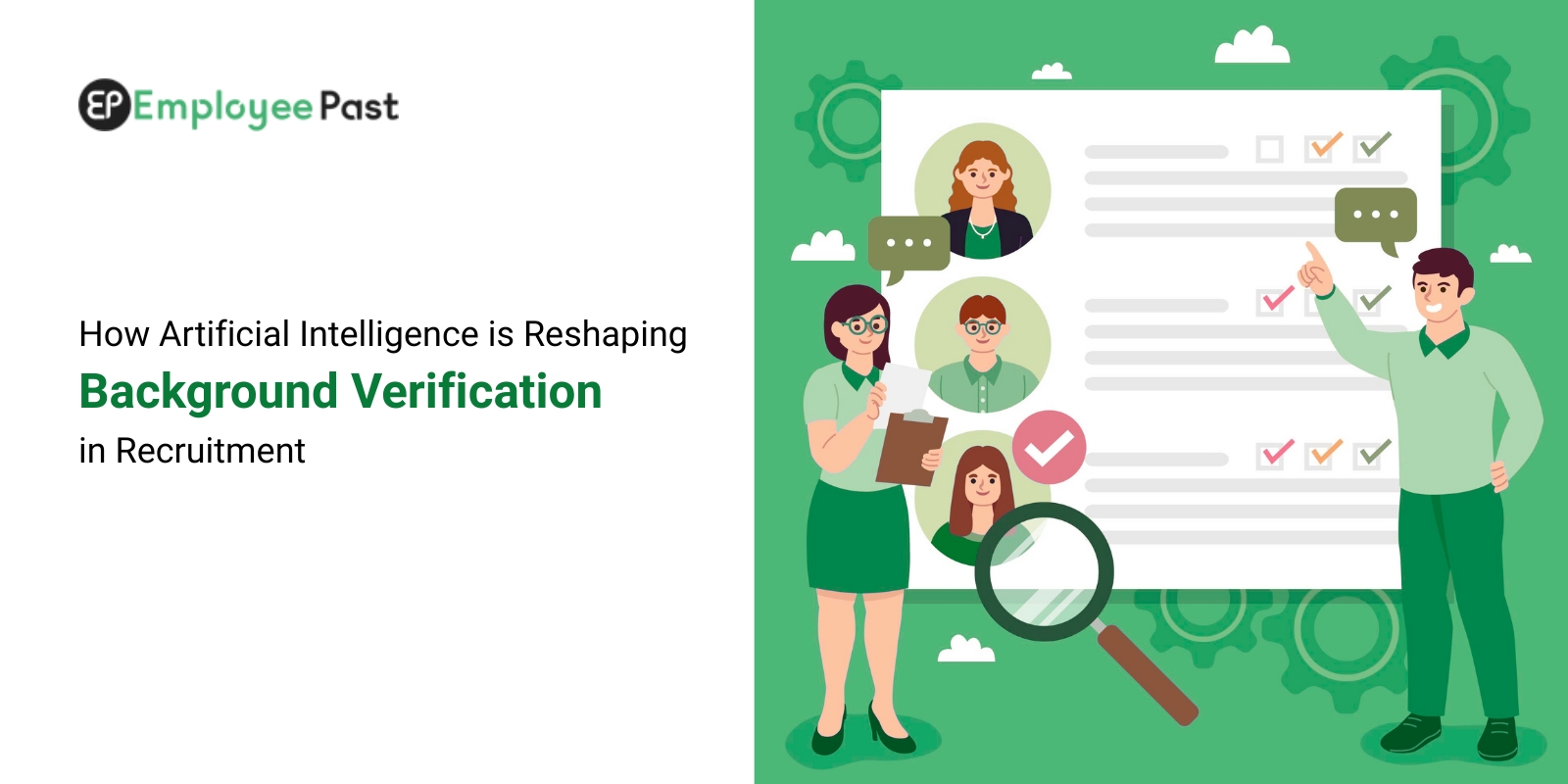- May 14, 2025
- Updates
- 1743
Share this post on:

In today’s fast-paced digital hiring landscape, Artificial Intelligence (AI) is becoming an essential part of background verification processes. Traditional methods of verifying a candidate's past have long been time-consuming, error-prone, and resource-intensive. But thanks to AI, what once took weeks can now be completed in hours—with greater accuracy and reliability. This transformation is revolutionizing the recruitment process across industries.
What is AI-Powered Background Verification?
AI-powered background verification involves using intelligent algorithms, machine learning models, and automation tools to screen candidates more efficiently and accurately. It analyzes vast amounts of structured and unstructured data from multiple sources including criminal databases, credit history, employment records, education credentials, and social media activity.
Unlike manual checks, AI systems can quickly flag inconsistencies, identify potential fraud, and streamline decision-making—all while ensuring compliance with privacy laws and regulations.
Advantages of AI in Background Checks
1. Speed and Efficiency
One of the most notable benefits of AI in background screening is the dramatic reduction in turnaround time. Where manual checks might take days or even weeks, AI algorithms can scan and analyze thousands of records in minutes.
This accelerated process helps HR departments to fill critical positions faster and maintain a competitive edge in talent acquisition.
2. Improved Accuracy and Reduced Human Error
Traditional verification is susceptible to manual errors and oversight. AI mitigates these risks by utilizing deep learning and pattern recognition to accurately cross-reference information, detect fake credentials, and flag inconsistencies.
The result is higher-quality hires and a reduced risk of negligent hiring.
3. Enhanced Compliance and Risk Mitigation
With constantly changing data protection laws like GDPR, CCPA, and local labor laws, compliance can be a moving target. AI can be programmed to follow specific regulatory frameworks, ensuring automated legal compliance during every background check.
This protects organizations from legal repercussions and reputational damage while reinforcing trust in their hiring practices.
4. Continuous Monitoring Post-Hiring
AI doesn't stop at pre-employment screening. Ongoing background monitoring can be set up to receive real-time alerts about employee criminal activity, regulatory violations, or other red flags, which is particularly useful in high-trust sectors like finance, healthcare, and government.
This provides employers with a proactive approach to workforce risk management.
Key Technologies Powering AI Background Checks
Natural Language Processing (NLP)
NLP enables AI to read and understand documents like resumes, academic transcripts, employment letters, and online profiles. It can extract relevant data, compare it with existing records, and identify discrepancies with high precision.
Optical Character Recognition (OCR)
OCR technology allows AI to digitize and analyze text from scanned documents, ID cards, certificates, and more. Combined with image recognition, it makes document verification faster and more reliable.
Machine Learning Algorithms
Through predictive analytics and historical data analysis, machine learning algorithms help recruiters determine the potential risk a candidate might pose based on patterns in their background. These models learn and improve over time, refining the accuracy of background checks continuously.
Blockchain Integration
Some providers are integrating blockchain to ensure data immutability and trust in background records. Once verified, credentials stored on a blockchain cannot be altered, giving both employers and employees peace of mind.
Use Cases in Various Industries
1. IT & Tech Companies
With access to sensitive data and critical infrastructure, tech firms rely heavily on thorough and rapid background checks to protect intellectual property and customer data.
2. Healthcare Providers
Healthcare employers must verify qualifications, licenses, and any past malpractice. AI helps in cross-verifying certifications and disciplinary actions against national medical registries.
3. Financial Institutions
Due to strict regulations, banks and finance companies use AI to screen for criminal records, credit history, and financial fraud. Continuous monitoring further helps in risk mitigation.
4. Gig Economy and Freelancers
Platforms like Uber and Airbnb have turned to AI to perform quick yet thorough background checks on gig workers and hosts, ensuring safety for their customers.
Challenges and Ethical Considerations
While the benefits are numerous, AI in background checks raises concerns over bias, data privacy, and transparency. It’s crucial for developers and users to train AI models on diverse datasets and maintain ethical oversight to prevent discriminatory practices.
Moreover, clear communication with candidates about how their data is used and ensuring consent-based checks is essential for building trust.
Future Trends in AI Background Screening
Voice and facial recognition will play larger roles in verifying identities.
AI chatbots will handle candidate verifications and answer queries in real time.
Predictive behavior analysis will help companies assess candidate reliability beyond just past records.
Global data access integration will allow companies to verify records across borders, a boon for remote and international hiring.
Conclusion: AI is the New Standard in Background Checks
AI is not just improving background verification—it’s redefining it. By reducing turnaround times, improving accuracy, enhancing compliance, and enabling real-time risk detection, AI is becoming an indispensable asset in the recruitment process.
As companies strive to build secure, compliant, and high-performing teams, AI-driven background checks offer a scalable and future-ready solution.
EmployeePast is one of the leading background screening solution providers, offering AI-powered verification systems tailored for businesses of all sizes. Their smart screening processes enable employers to make confident hiring decisions based on verified, real-time data.










